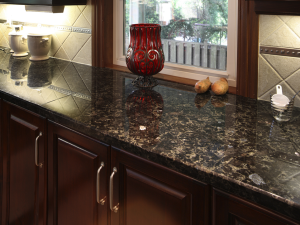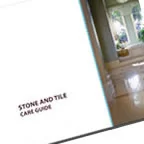
Selecting Stone and Tile
Tips from a stone care pro for selecting and buying stone and tile
Are you building a new home? Restoring or re-decorating your old home? Are you an architect or interior designer in need of some direction with which tile to specify? The selection of tile and stone can be difficult, confusing even overwhelming. There are hundreds and hundreds of choices to make and if you have done any shopping I’m sure you have received an endless flow of advice, maybe even conflicting advice. I hope that you find the following information will arm you with the essential information you need to make the selection process easier, less confusing and even enjoyable.
THE BEAUTY OF IT ALL
Of course your first consideration is how it will look. With today’s options there is no reason to settle for anything less than stunning. Start with what is the overall feel you are aiming for. What type of decor will you be using in the room? A Southwestern style may require a Mexican tile floor. If the room is very elegant, marble or granite may work best. Be sure when selecting your tile that you take into consideration the decor of the room and that the tile compliments the mood.
Choose design, colors and styles that you will not tire of easily. Tile will often last as long as the house, so be sure you are happy with your selection. If in doubt, consult with an interior designer. Many tile and stone stores have designers on staff that will be more than happy to assist you with the proper selection. For inspiration and ideas, refer to tile and stone inspiration galleries such as the one on stoneandtilepros.com.
TRAFFIC AND WEAR
One of the biggest mistakes made in tile selection is choosing a stone or tile that is not suited for the traffic or usage it will be subjected to. Some marbles are very soft and should not be used in any area that will have to endure high traffic. A softer marble in a busy hotel lobby is a poor choice but may work well in a residential foyer. How easily does the material scratch?
TIP An easy test to perform is to take a pocket knife blade and run it lightly across the tile. If the blade leaves a scratch it will probably wear poorly in high traffic areas.
For the Architect or Designer refer to ASTM C241- Abrasive Resistance
STAIN AND ACID RESISTANCE
I will never forget a customer of mine who was a gourmet cook and installed beautiful white marble on her kitchen countertops. The marble was highly polished, very soft and not sealed. Needless to say in less than a month the marble was stained with every color of the rainbow and had lost its deep shine. Look carefully at the use the tile is to receive and determine how easy it will stain or etch. If you must use marble on a well-used kitchen countertop, be sure to seal it properly to inhibit staining agents from being able to seep in. The more absorbent the tile or stone, the more likely it will stain if not sealed. Etching, on the other hand is caused from acidic liquids coming in contact with acid-sensitive stones. Marble is rarely recommended for a kitchen because of its acid sensitivity.
For the Architect and Designer refer to ASTM C97-Absorption and Specific Gravity.
COST
Unfortunately cost is usually the deciding factor when selecting tile or stone. Cost can also be very misleading.
An inexpensive stone or tile may fit into your budget, but if it wears easily the cost of restoration, repair or replacement often will ultimately be more costly than not. Thoroughly investigate the maintenance requirements of the selected tile. Shop around and ask a lot of questions. The tile and stone market is very competitive so bargains can be found.
Warning: Tile and stone are available in different grades. The poorer grades may be cheaper but will have imperfections and flaws. Examine each tile carefully before it is installed.
TIP It is also a good idea to spend a little extra and buy spare tile in case tiles need to be replaced later. This is especially important with marble and ceramic since colors and patterns can be impossible to match later on.
Whatever your budget, do your homework and buy the best quality you can afford.
SAFETY
It is astonishing how many injuries occur each year due to slipping and falling. When choosing tile or stone, be sure it is not slippery. A highly polished granite tile on a shower floor may be a poor choice and a slip hazard, for example.
Honed, textured or flamed finishes may be less slippery. Ask us about treatments that can be applied to the surface of tile and stone to make it slip resistant.
For the Architect or Designer refer to ASTM test methods for coefficient of friction.
INSTALLATION
Who will do the installation? Many simple tiling projects can be performed by the do-it-yourselfer but more intricate projects and certain tiles, such as marble, should be left to the professional installer. Be sure to choose an installer familiar with installation of the tile type you select. Installation of ceramic tile differs from installation of stone.
SUB-FLOORING
What is the condition of the sub-floor (the floor the tile is to be installed on)? Is there an existing floor material or tile? Many times the sub-floor will have to be properly prepared before installation can begin. If you are tiling over an existing vinyl or tile floor, different setting materials will be needed so that proper bonding of the new tile will occur. If in doubt ask us for advice.
MAINTENANCE
Maintenance is the most overlooked factor when choosing stone or tile. Just because a stone or tile cost more doesn’t mean its maintenance requirements are less. There is no such thing as maintenance free! A twenty-cents-per-square-foot vinyl requires maintenance just as much as a thirty dollar per square foot stone. Be sure to understand the maintenance requirement of the tile or stone you select before you buy. Ask to see the maintenance guide for the tile type. It may also be a good idea to check with a friend or neighbor that has the same type of tile and ask them how easy or difficult it is to maintain.











